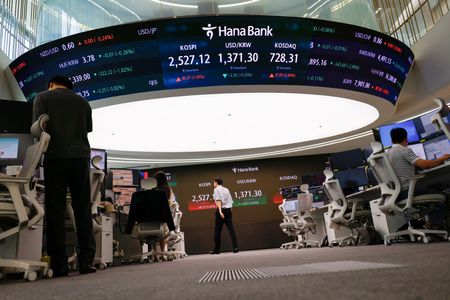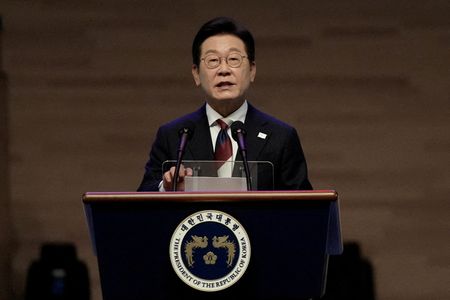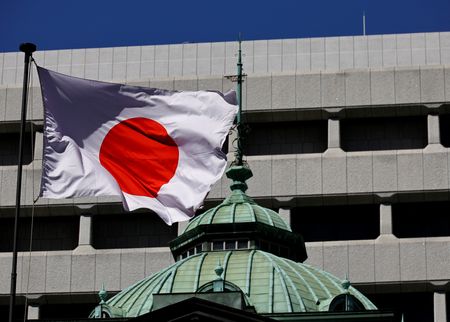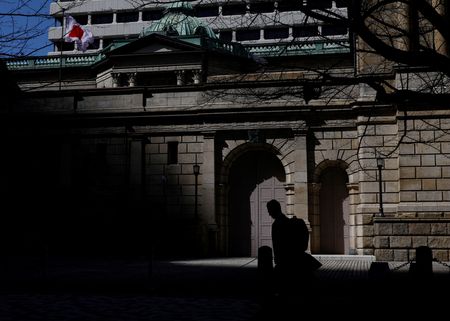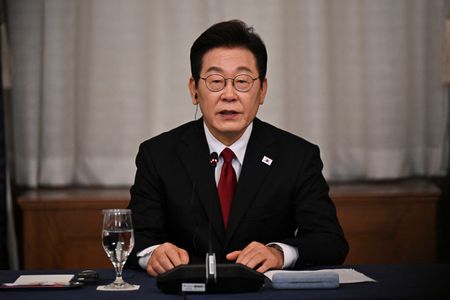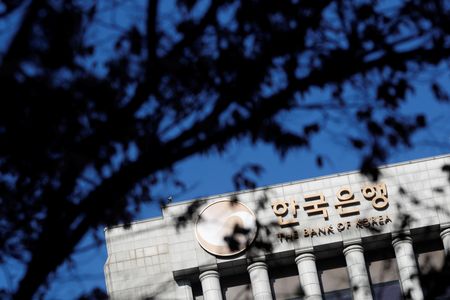By Rae Wee and Vidya Ranganathan
SINGAPORE (Reuters) -As the currencies of South Korea, Taiwan and Japan rise, so too is chatter that these economies could use exchange rate revaluation as a carrot in trade talks with U.S. President Donald Trump.
While a stronger currency has historically meant a competitive disadvantage for these Asian exporters, revaluation may now be the least costly bargaining chip in their scramble for favourable trading terms with the U.S.
The Korean won surged this week after officials there said currency policy was discussed at a meeting they had in Milan with U.S. officials on May 5. That comes just days after U.S.-Taiwan talks triggered an unprecedented 8% surge in the Taiwan dollar.
Japan’s finance minister is meanwhile seeking to meet U.S. Treasury Secretary Scott Bessent at the G7 meetings in Canada next week to discuss foreign exchange.
Market participants have been quick to connect these developments with China’s surprise 90-day trade truce with United States on the weekend at Geneva.
“This China deal is very bad news for Korea, for Japan, for anybody waiting in the queue, because now they need to offer what China managed to avoid,” said Alicia Garcia-Herrero, chief economist for Asia Pacific at Natixis.
She believes Taiwan may have agreed to revalue its currency as part of trade negotiations, while China pushed back against such a request.
The clock is ticking for export-reliant Asia. Trump’s April 2 reciprocal tariffs, ranging from 25% for South Korea to 46% for Vietnam, were suspended for 90 days but could kick in on July 8, unless deals are struck.
There is greater urgency for China’s immediate neighbours Japan, Korea and Taiwan, which risk being displaced from semiconductor and autos supply chains as China and India expedite negotiations with Trump.
China, Japan, South Korea, Singapore, Taiwan and Vietnam are also among the economies on the U.S. Treasury’s “monitoring list” for currency practices – something Trump’s team could use as a talking point in negotiations.
“The Koreans might think, ‘well actually a stronger currency is in our interest and so we may as well propose this in these negotiations’,” said HSBC’s chief Asia economist Fred Neumann.
“These currency angles are only coming up in certain negotiations and not in others, maybe because the U.S. is not insisting on it, but it’s really the other country that has brought them in as a way to kind of appease U.S. demands.”
TAIL WAGGING THE DOG
Trump and Bessent have both expressed a preference for a strong dollar, though that has done little to squelch suspicion that the U.S. President wants an adjustment lower in the world’s top reserve currency, a deal dubbed the Mar-a-Lago accord.
“If one country comes out and agrees with the Trump team that they are going to maybe accept a slightly stronger currency, then it sets the tone for the others,” said Homin Lee, senior macro strategist at Lombard Odier in Singapore.
A weaker dollar could theoretically reduce the burgeoning U.S. trade deficits with the rest of the world. Investors have used that hunch to sell the dollar and U.S. assets in the past few weeks.
Taiwan’s central bank has repeatedly denied the United States asked Taipei to allow its currency to appreciate during tariff talks with Washington.
But one Taiwan source familiar with the matter expects foreign exchange issues will eventually come up in any negotiations.
“No one can withstand U.S. pressure,” the source said, speaking on condition of anonymity given the sensitivity of the matter.
In Asia, analysts also make the case that most Asian currencies are weaker than their long-run trade-and-inflation-adjusted real effective exchange rates, which means they have room to trade higher.
Yet, analysts also say the undervaluation of the yen, won, yuan and Taiwan dollar are a result of disinflationary pressures in these economies that make their goods cheaper by the day.
“The solution to that problem would be more fiscal stimulus, more encouragement of domestic demand,” said BofA strategist Claudio Piron.
“You could argue if they appreciate their currencies, it could worsen the problem by creating more disinflation and deflation as well.”
RISKY BUSINESS
Not only is the plan fraught with such economic risks, it could also be unsafe for markets.
For one, Asian governments and citizens own tens of trillions in dollars assets that they’d need to sell as the greenback falls.
That includes a chunk of the $33 trillion of dollar-based stocks and bonds foreigners held at the end of 2024, and Asia’s roughly $7.5 trillion foreign reserves plus a couple of trillions more of dollar deposits retail investors and exporters have accumulated.
Equally challenging is the idea that governments can manipulate their currencies, even in Asia’s less open markets.
HSBC’s Neumann reckons currency deals, if any, will not be ironclad and could at most be broad statements of principles on currency management that ultimately don’t make too many demands on individual countries.
“Nowadays central banks can only lean a little bit against the wind, they can’t affect the overall direction of currencies,” he said.
Tohru Sasaki, chief strategist at Fukuoka Financial Group, says any kind of currency accord, similar to the 1985 Plaza Accord to weaken the dollar, is unlikely.
“Some people say ‘maybe the U.S. and Japan will agree to see a 10% higher yen against the dollar.’ But how can we do it and how can we manage to keep it?” said Sasaki. “So it’s something like a dream. In the real world it’s impossible.”
(Reporting by Rae Wee and Vidya RanganathanAdditional reporting by Liang-sa Loh in Taipei, Tom Westbrook in Singapore and Rocky Swift in Tokyo; Editing by Sam Holmes)

